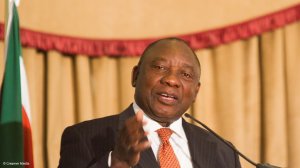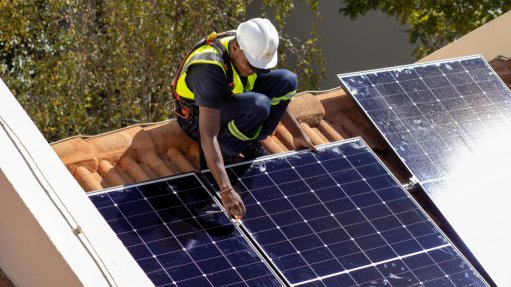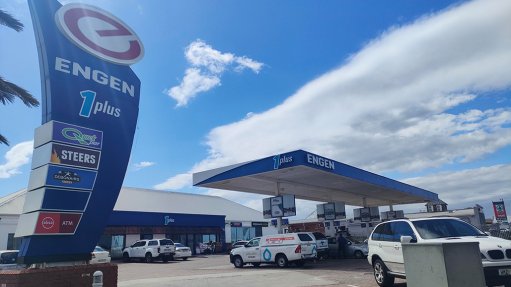Govt, business, labour to grapple with hostile labour climate at Nov summit

Deputy President Cyril Ramaphosa outlines plans for a National Labour Relations Indaba in November. Camera Work & Editing: Nicholas Boyd. Recorded: 5.9.2014.
Deputy President Cyril Ramaphosa announced on Friday that a National Labour Relations Indaba would be convened in November to enable the social partners to begin grappling with the root causes of South Africa’s prevailing hostile labour relations environment, which was sapping confidence and weighing on growth, employment and investment prospects.
Labour market instability was cited, along with weak economic growth and electricity shortages, as a major reason for recent downgrades in the country’s credit rating. South Africa experienced a protracted platinum-sector strike in the first few months of the year, which coincided with a first-quarter economic contraction. It was followed by a shorter, but similarly damaging, engineering-sector strike.
The high-level gathering would involve government, business, labour and community groupings as constituted through the National Economic Development and Labour Council (Nedlac), which Ramaphosa described as the “brains trust” for resolving the current crisis.
In a rousing address to Nedlac’s nineteenth annual summit in Johannesburg, the Deputy President said the social partners needed to “attend to the causes of protracted strikes, rather than assuming measures that only address themselves to the symptoms”.
Common ground should be “negotiated” through Nedlac, which Ramaphosa held up as South Africa’s “apex” institution for social dialogue on socioeconomic matters.
“We need to understand the factors behind these protracted conflicts in the workplace and agree as social partners on steps on how we are going to address them.”
But he warned that the issues could not be resolved merely by amending labour laws. Instead, agreement was required “between social partners on the reorganisation of inclusive negotiations and of bargaining processes within workplaces and across sectors, as well as the modification and expansion of the social wage”.
MINIMUM WAGE
The meeting, which was flagged by President Jacob Zuma in his June 17 State of the Nation Address to Parliament, would also examine the issue of income inequality and “develop measures to reduce it”.
“Among other things, we need to examine the value and possible challenges of implementing a national minimum wage,” Ramaphosa said, adding that he expected the social partners to present their proposals to facilitate a thorough and thoughtful engagement on the issue.
“This will help us identify areas of commonality and measure how far social partners are from each other, thus shaping further engagement as we move towards preparing a framework document outlining possible modalities and parameters for the introduction of the national minimum wage.”
Business Unity South Africa’s Jabu Mabuza also appealed for a new spirit of dialogue, which could remain robust and even combative, but which did not “destroy us in the process”.
Mabuza also urged the social partners to more fully utilise the Nedlac structures to deal with the issues currently constraining growth and development. But he said there was a need for the constituency leaders to place national interest first, which might “take us out of our comfort zones”.
However, the Congress of South African Trade Unions’ Sdumo Dlamini stressed that, while labour, too, supported social dialogue, it was concerned that Nedlac was being bypassed and that decisions were being “rammed” through by government.
He made specific reference to the handling of the Employment Tax Incentive Bill and warned that Cosatu stood ready to protest unless a moratorium was placed on changes to the retirement reforms. Dlamini also stressed that labour’s objections to the National Development Plan had not yet been addressed.
Ramaphosa appealed for disagreements to be ventilated through social dialogue and negotiation rather than protest, saying government would “dedicate its energies to forging a social compact that brings together all South Africans in pursuit of a common vision for change”.
Comments
Press Office
Announcements
What's On
Subscribe to improve your user experience...
Option 1 (equivalent of R125 a month):
Receive a weekly copy of Creamer Media's Engineering News & Mining Weekly magazine
(print copy for those in South Africa and e-magazine for those outside of South Africa)
Receive daily email newsletters
Access to full search results
Access archive of magazine back copies
Access to Projects in Progress
Access to ONE Research Report of your choice in PDF format
Option 2 (equivalent of R375 a month):
All benefits from Option 1
PLUS
Access to Creamer Media's Research Channel Africa for ALL Research Reports, in PDF format, on various industrial and mining sectors
including Electricity; Water; Energy Transition; Hydrogen; Roads, Rail and Ports; Coal; Gold; Platinum; Battery Metals; etc.
Already a subscriber?
Forgotten your password?
Receive weekly copy of Creamer Media's Engineering News & Mining Weekly magazine (print copy for those in South Africa and e-magazine for those outside of South Africa)
➕
Recieve daily email newsletters
➕
Access to full search results
➕
Access archive of magazine back copies
➕
Access to Projects in Progress
➕
Access to ONE Research Report of your choice in PDF format
RESEARCH CHANNEL AFRICA
R4500 (equivalent of R375 a month)
SUBSCRIBEAll benefits from Option 1
➕
Access to Creamer Media's Research Channel Africa for ALL Research Reports on various industrial and mining sectors, in PDF format, including on:
Electricity
➕
Water
➕
Energy Transition
➕
Hydrogen
➕
Roads, Rail and Ports
➕
Coal
➕
Gold
➕
Platinum
➕
Battery Metals
➕
etc.
Receive all benefits from Option 1 or Option 2 delivered to numerous people at your company
➕
Multiple User names and Passwords for simultaneous log-ins
➕
Intranet integration access to all in your organisation



















